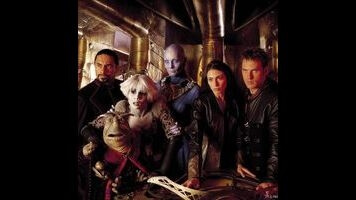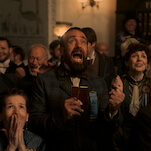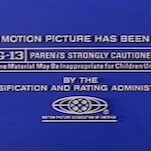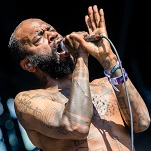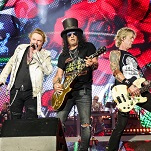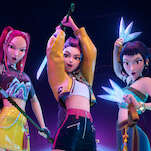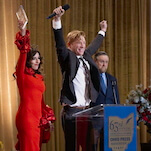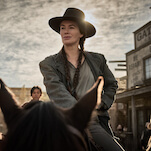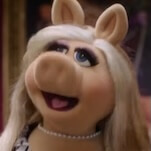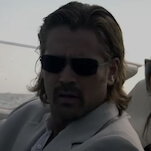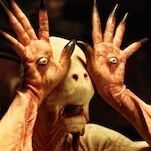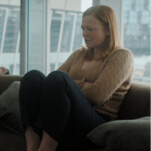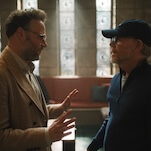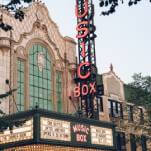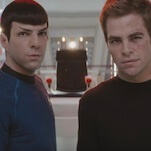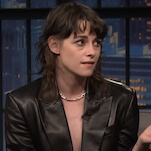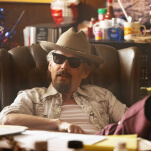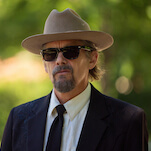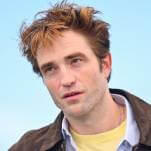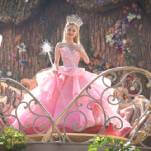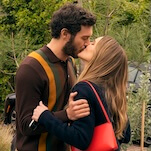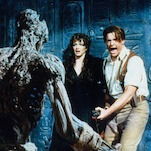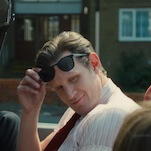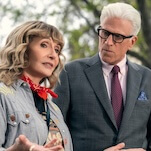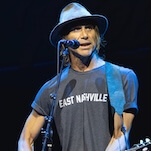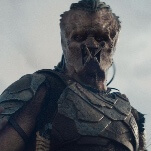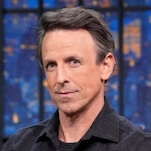“Throne For A Loss” (season 1, episode 4; originally aired 4/9/1999)
(Available on Hulu and Amazon Instant Video.)
“Rygel is an obnoxious gasbag, and who’s going to shell out for that?” “He’s right! I’m unloved, unwanted, unpopular… unconscious!”
There’s a venerable if rather bizarre tradition of science fiction shows messing around with their main characters’ personalities before the audience has really gotten to know who these people are. Both the original Star Trek and The Next Generation went to this well within their first four episodes with the classic “The Naked Time” and its misbegotten sequel “The Naked Now”, and Deep Space Nine recast its main characters’ personalities late in its first season with “Dramatis Personae.” This trope works on the Star Trek shows in part because, even if the characters haven’t snapped into focus yet, the shows’ setting provides a baseline for its characters—these are all highly trained officers, and so any lackadaisical or outlandish behavior is an immediate sign that what we’re seeing isn’t their real personalities. In “Throne For A Loss,” Farscape uses the Tavlek gauntlet to trigger what seems like out-of-character behavior from D’Argo and Aeryn, but it doesn’t let its characters off the hook so easily. Instead of sheepishly apologizing for their insane antics, both characters double down, insisting that they meant every word when they alternately tried to take over the ship and threatened to massacre the Tavleks.
This is a daring bit of storytelling, particularly in its handling of D’Argo, even if it doesn’t totally work. Much like the general craziness of “Premiere,” the gauntlet storyline trusts the audience to follow along as D’Argo abandons Rygel, assaults John and Aeryn, declares martial law over Moya, and generally acts like a big Luxan psychopath. While it’s clear that something is wrong—his kicking of a cute little DRD is particularly telling—we don’t yet know D’Argo well enough to judge properly the strangeness of his behavior. It’s not difficult to see D’Argo deciding to leave Rygel behind, even without the gauntlet, and his very first encounter with Crichton involved D’Argo nearly choking the poor human to death. Similarly, Aeryn seems way more bloodthirsty than normal when she declares her plans to kill at the Tavleks, but she is a Peacekeeper, and based on what we’ve seen of Peacekeepers, it’s not beyond the bounds of plausibility for Aeryn to have previously participated in such murderous behavior. Indeed, her subsequent dismissal of D’Argo as a barbarian doesn’t sound like something she would need the gauntlet to make her say.
This can feel sloppy when first watching, but it’s a calculated sloppiness. Crichton takes them to task for their behavior, arguing that if this is who they really are, they have some serious reflecting to do. “Throne For A Loss” introduces this idea without quite resolving it, but that’s the point—Farscape doesn’t want the audience to get comfortable with its characters just yet. When Aeryn incapacitates John, it’s initially played as a comedic moment, with Crichton once again referring to the aliens as “Tavloids” and Aeryn correcting him after she knocks him out. But when he wakes up in the Prowler, Crichton reacts like any sane person would upon learning a friend knocked him out to get her own way; he’s righteously angry, and he tells her she better not do that again unless she intends to kill him. Aeryn brushes off the warning, and the tone shifts back to comedy—and besides, Aeryn gets her just deserts when D’Argo drops her in an intentional display of “Luxan clumsiness”—but there’s some weight to the character’s action and a sense that their mistakes could have consequences.
The reason this doesn’t quite work is that Crichton gives his big, angry speech to D’Argo and Aeryn about their true natures, and then there’s no real follow-up, as Crichton busies himself with saving Rygel from the Tavleks. Led by the grizzled Bekhesh, the Tavleks are more interesting than the Deneans in “I, E.T.”—particularly from a visual standpoint—but they still feature in a similarly perfunctory story. As Bekhesh, John Adam projects a nice mix of world-weariness and twisted ethics, and his final line to Crichton about how he doesn’t even recognize the truth anymore crystallizes an idea that had previously been on the fringes of this episode, which is that the Moya crew find themselves in this largely because of their lies. Rygel is the worst offender, and “Throne For A Loss” offers more insight into why the Hynerian is the way that he is.
He’s unbearably haughty when he points out his crewmates should call him his Supreme Eminence, and his rudeness to his captor Bekhesh reveals his basic refusal to understand that he isn’t still Dominar and that the universe doesn’t exist to satiate his desires and whims. His hysterical breakdown when Jotheb reveals why he brought him back from the dead—which, incidentally, is a deeply weird moment that is quickly forgotten, so I’ll follow the episode’s lead—serves as the perfect capper, allowing Rygel a moment of honesty and self-pity without sacrificing the character’s harder edge. While Crichton seems to show Rygel some compassion when he initially avoids revealing the truth to Bekhesh, it’s never forgotten that it’s the purloined control crystal, not concern for Rygel, that motivated the rescue mission. “Throne For A Loss” repeatedly emphasizes that our main characters aren’t friends, and that their concern for one another is motivated more by self-interest than any noble impulse.
This darker edge to Farscape is most painfully apparent in Zhaan’s story, as she tries to steer the captured Tavlek warrior Kyr towards a better path. At first glance, this story seems like a clichéd sci-fi parable about a saintly priest helping someone overcome their drug addiction, but that quickly falls apart, if for no other reason than it becomes damn clear that Zhaan is no saint, and I’m not talking about her nudity (although that’s certainly memorable). When Kyr betrays her trust and tries to take some stimulant, she easily defeats him, telling him that she could rip him apart and indeed would enjoy the experience. Zhaan told us in “Premiere” that she was her world’s foremost anarchist, so it’s not hard to believe she means every word of her threat. Her efforts to save Kyr aren’t solely for his benefit; they are also part of her own ongoing efforts to save herself. Zhaan is generally so serene that this suggested arc isn’t entirely convincing, but Virginia Hey sells the character’s sudden shift to violence.
The conclusion to Zhaan and Kyr’s story neatly contrasts short-term and long-term consequences. Zhaan’s kind treatment of Kyr indisputably does tangible good, as it motivates him to tell Bekhesh the truth and so indirectly saves Rygel and Crichton’s lives. But as Zhaan learns at episode’s end, Kyr immediately goes back to the gauntlet once he’s freed from captivity. He emphasizes that this is his choice, which is what Zhaan said she wanted him to make in the first place. A crestfallen Zhaan quietly observes, “No sermons,” as the episode concludes. The moment doesn’t land as powerfully as it might in a later episode, as this is still Farscape finding its way and figuring out how best to develop its themes and make its points. While “Throne For A Loss” is rough around the edges, it establishes that the show is unafraid to tell messy, complicated stories that have no easy endings. Like the last three episodes, this is another key step forward, even if the episode stumbles a bit in the process.
Stray observations:
- Jotheb, next in succession to preside over the Consortium of Trao, is a wonderfully alien creation in look, sound, and personality, and the episode wisely keeps him just enough in the shadows that you can’t quite work out what the hell he is. It’s also a great touch for Crichton to call him a critter when he first sees him—even by the standards of the aliens Crichton has seen so far, Jotheb is bizarre.
- Ben Browder mentions in the DVD commentary that he insisted Aeryn knock Crichton unconscious, as he felt there was no other way Crichton would get in the Prowler after Aeryn attacked him. We’ve never seen Crichton as enraged as he is when talking to Aeryn in the Prowler, and the actor’s input into the scene makes it a particularly interesting moment.
- There seems to be some disagreement over whether the planet’s blue flowers are the result of CGI or some expert color grading, but either way, it’s a terrific special effect.
- Am I the only one who finds Rygel weirdly cute when Crichton talks to him at the end?
- “I did wash it… Well, I think I did.” That’s one of the all-time great poop jokes, ladies and gentlemen.
“Back And Back And Back To The Future” (season 1, episode 5; originally aired 4/2/1999)
(Available on Hulu and Amazon Instant Video.)
“I’m curious about Crichton.” “Far too complex, I’m afraid, for you to know in the short time that you'll be here. I suggest you shouldn’t try.”
“Back And Back And Back To The Future”—henceforward referred to just as “Future”, because I refuse to write the word “Back” thirty more times—represents an evolution in the kind of stories Farscape is willing to tell. While the show’s premise has always been weird, the plots the show has pursued so far have boiled down to straightforward, relatively normal concepts. “Premiere” is just about explaining the setup, “I, E.T.” is about Crichton looking for a vital material and making first contact with an alien race, “Throne For A Loss” is about Rygel getting kidnapped, and even the fairly weird “Exodus From Genesis” is essentially another story of alien races meeting and interacting. With “Future,” Farscape expands its repertoire by messing around with a form of time travel. It makes for a much more complex episode structurally, and it signals that the show is willing to tackle all the great outlandish sci-fi tropes. This is easily the highlight of the first batch of episodes.
Before we get to the temporal craziness, it’s also worth noting how “Future” handles sex. Put simply, none of this story would unfold the way it does if D’Argo weren’t so damn horny. He again mentions his eight cycles of Peacekeeper imprisonment, first in the context of his ignorance of the Ilanic-Scorvian war but then in terms of just how long it’s been since he’s had sex. As he notes at the end of “Future,” he wouldn’t normally be so affected by a woman during a crisis, but it’s been so damn long—something Crichton ruefully says he understands. In “Premiere,” Zhaan suggested D’Argo was still a boy by Luxan standards, and Anthony Simcoe plays D’Argo like an awkward teenager; he’s too bashful to discuss his feelings for Matala with Verell, and his intonations and body language when Crichton interrupts his flirting with Matala is a wonderfully funny display of romantic ineptitude. For “Future” to work, D’Argo needs to temporarily ally himself with Matala against the Moya crew. The pact between the Luxans and the Ilanics could provide adequate motivation, but it’s a dry, abstract reason for D’Argo to oppose Crichton. His motivations go beyond more staid concepts like honor or even love—D’Argo is blinded by lust, projecting his own desperation onto Crichton and so ignoring the human’s very real concerns. The episode’s frank approach to sex gives D’Argo’s actions a visceral, primal edge that would otherwise be absent.
If “Future” has a weakness, it’s in the Ilanics. Lisa Hensley’s performance as Matala is deeply strange, full of odd pauses and affected line readings that sometimes sound alien and devious but sometimes just sound stilted. There’s never really any doubt that Matala is the villain of the story, but then tricky enough keeping track of where Crichton is up to in time without also trying to sort out multiple characters’ allegiances; as such, this over-the-top, transparently evil performance serves a useful narrative function. Even so, this is a love-it or hate-it kind of performance, and I’m still not entirely into which camp I fall. The look of the Ilanics generally works well, conveying the sense that these are the Luxans’ less fearsome genetic cousins. Matala’s appearance has to pull off the tricky feat of being attractive both to a Luxan like D’Argo and, at least theoretically, to a human like Crichton. The drawback to the Ilanic makeup is one that Ben Browder and episode director Rowan Woods point out on the commentary—to avoid making his giant tentacles jiggle about, Verell actor John Clayton has to remain perfectly still at all times. He still turns in a good performance despite being virtually immobile, but there are a few times in the episode where he appears frozen in place for no clear reason, in particular when Matala first puts the moves on D’Argo. While the Ilanic makeup works well aesthetically, it’s a bit of a misfire from a practical perspective.
Crichton’s temporal disclocation drives the episode, although it’s disguised early on. Anyone who knows the title of the episode is likely to guess that Crichton’s apparent sexual fantasies are in fact flashes of the future, but his scenes with Matala are so dark and so bizarre that it’s easy to see why the original audience might have been flummoxed in the early going. As such, Crichton’s vision of a conversation he’s about to have with Aeryn in ten seconds’ time is a key pivot, a sequence that works well in keying both Crichton and the audience into the nature of this seemingly impossible phenomenon. It’s also a fun example in miniature of the episode’s narrative complexity, as Crichton’s stunned reaction to Aeryn in the “future” is revealed to itself be the effect of déjà vu, something he only experiences in the “present” because he just saw what was about to happen. The scene gleefully muddles causality and garbles the timeline, and that only increases as Crichton gets more and more unstuck in time, to use the phrase Crichton fittingly borrows from Kurt Vonnegut’s Slaughterhouse-Five.
The episode’s most fiendish misdirection comes when Crichton discusses his situation with Zhaan and experiences multiple lengthy visions of the future—except because there’s no clear gap between present and future, Crichton doesn’t realize what’s going on until he snaps back to Zhaan’s quarters. Crichton breaking the masks serves as an effective signpost for when Crichton embarks upon a new timeline; fittingly, it’s an accident the first two times, but he intentionally smashes the mask on his last time through to indicate his renewed, possibly insane sense of purpose. The second snapback is particularly sadistic, as Crichton’s vision takes up an entire act of the episode and features crucial scenes between first D’Argo and Matala and then Crichton and Virell before concluding with Moya’s fatal implosion as the Ilanics’ black hole destabilizes. The return to Zhaan’s quarters at the end of all that stands as Farscape’s most daring narrative risk to date, and it pays off brilliantly.
“Future” wouldn’t work as nearly as well as it does if not for Ben Browder’s frantic, unhinged performance, as he forcefully conveys Crichton’s growing madness as he is forced to relive the same events over and over. Browder is faced with a near-impossible task, considering he has to somehow convey the incomprehensible idea that Crichton is experiencing the pain of his own death in the future, then returning to the present safe and sound. He’s aided in this task by Rowan Woods, whose subtly claustrophobic direction—as he explains on the commentary, he used the same angles for each time through Zhaan’s quarters, only went for tighter close-ups each time—plays up the idea that time is collapsing around Crichton, leaving him without so much as the present to call his own.
The episode’s conclusion, in which Crichton finally finds a sequence of events in which he can defeat Matala, feels like a slight letdown after all the temporal insanity, although it’s hard to complain too much about a resolution in which Moya starbursts to safety just as Matala’s singularity-crippled shuttle crashes into the disguised Scorvian cruiser. And more than that display of visual effects, “Future” finds an ending that again hints at further hidden depths for its characters. After all, D’Argo only joins Crichton’s side once the human reveals that, in another version of events, he overheard D’Argo admitting that nobody on board Moya knows his true crime. All this is really just teasing a much bigger revelation down the line, but for now it simply provides D’Argo a strong, character-based reason to listen to Crichton, not to mention the first moment in which the human indisputably has the upper hand over the Luxan. In an episode full of incredible moments, that one might actually be the most remarkable.
Stray observations:
- Rygel doesn’t appear much in this episode, but the fact that he spends most of his time gorging himself is another good way to make him feel like more than a puppet—after all, puppets don’t have digestive systems.
- “He says he is experiencing the future.” “The future? He can barely function in the present.” This episode features an unprecedented amount of digs at Crichton’s general uselessness. Zhaan’s simple observation that “He is Crichton” after his latest inexplicable behavior is particularly cutting.
- Aeryn and Matala’s sparring session probably falls under the category of Farscape trying to create an alien form of something familiar—in this case, martial arts—and the end result just looking a bit silly. Still, the final overhead shot of Aeryn unconscious on the Peacekeeper symbol is a great visual.
Next week: D’Argo kicks back in “Thank God It’s Friday, Again” and Crichton finds someone special in “PK Tech Girl.”
